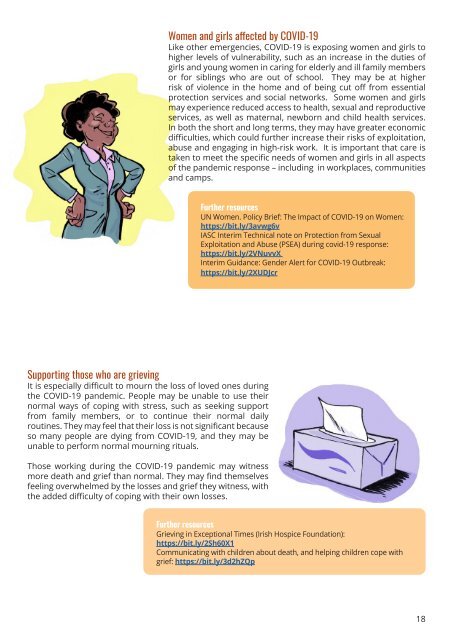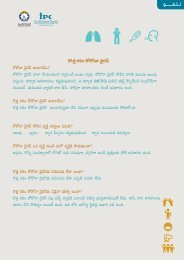WHO - Basic Psychosocial Skills- a guide for covid-19 responders
Basic Psychosocial Skills A Guide for COVID-19 Responders
Basic Psychosocial Skills A Guide for COVID-19 Responders
Create successful ePaper yourself
Turn your PDF publications into a flip-book with our unique Google optimized e-Paper software.
Women and girls affected by COVID-<strong>19</strong><br />
Like other emergencies, COVID-<strong>19</strong> is exposing women and girls to<br />
higher levels of vulnerability, such as an increase in the duties of<br />
girls and young women in caring <strong>for</strong> elderly and ill family members<br />
or <strong>for</strong> siblings who are out of school. They may be at higher<br />
risk of violence in the home and of being cut off from essential<br />
protection services and social networks. Some women and girls<br />
may experience reduced access to health, sexual and reproductive<br />
services, as well as maternal, newborn and child health services.<br />
In both the short and long terms, they may have greater economic<br />
difficulties, which could further increase their risks of exploitation,<br />
abuse and engaging in high-risk work. It is important that care is<br />
taken to meet the specific needs of women and girls in all aspects<br />
of the pandemic response – including in workplaces, communities<br />
and camps.<br />
Further resources<br />
UN Women. Policy Brief: The Impact of COVID-<strong>19</strong> on Women:<br />
https://bit.ly/3avwg6v<br />
IASC Interim Technical note on Protection from Sexual<br />
Exploitation and Abuse (PSEA) during <strong>covid</strong>-<strong>19</strong> response:<br />
https://bit.ly/2VNuvvX<br />
Interim Guidance: Gender Alert <strong>for</strong> COVID-<strong>19</strong> Outbreak:<br />
https://bit.ly/2XUDJcr<br />
Supporting those who are grieving<br />
It is especially difficult to mourn the loss of loved ones during<br />
the COVID-<strong>19</strong> pandemic. People may be unable to use their<br />
normal ways of coping with stress, such as seeking support<br />
from family members, or to continue their normal daily<br />
routines. They may feel that their loss is not significant because<br />
so many people are dying from COVID-<strong>19</strong>, and they may be<br />
unable to per<strong>for</strong>m normal mourning rituals.<br />
Those working during the COVID-<strong>19</strong> pandemic may witness<br />
more death and grief than normal. They may find themselves<br />
feeling overwhelmed by the losses and grief they witness, with<br />
the added difficulty of coping with their own losses.<br />
Further resources<br />
Grieving in Exceptional Times (Irish Hospice Foundation):<br />
https://bit.ly/2Sh60X1<br />
Communicating with children about death, and helping children cope with<br />
grief: https://bit.ly/3d2hZQp<br />
18












